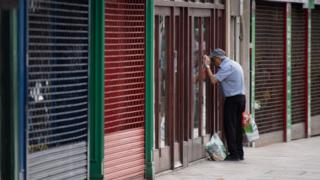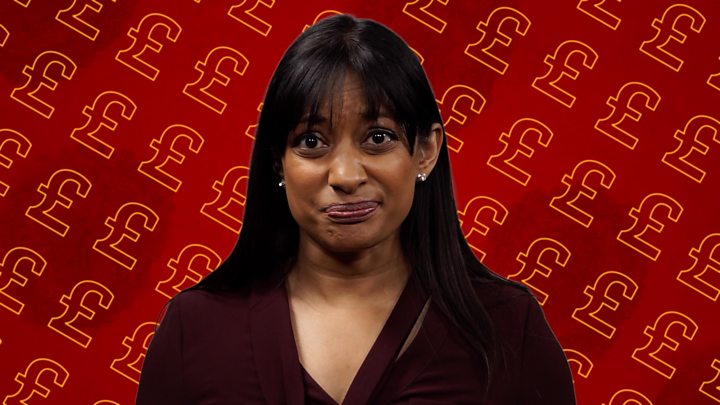
Getty Images
The UK, along with much of the rest of the world, is thought to be heading into the worst recession for decades.
So what exactly does that mean?
Table Of Contents
What is a recession?
In normal times, a country’s economy grows.
Its citizens, on average, become slightly richer as the value of the goods and services it produces – its Gross Domestic Product (GDP) – increases.
But sometimes the value of goods and services produced falls.
A recession is usually defined as when this happens for two three-month periods – or quarters – in a row.
If a recession carries on for a long time, or is particularly bad, it is known as a depression.
Why does it matter if there is a recession?
For most people, economic growth is a good thing.
It usually means there are more jobs, companies are more profitable and can pay employees and shareholders more.
Image copyright
Getty Images
Gross domestic product is a measure of the value of all the goods and services produced in an economy
A growing economy also means the government receives more money in taxes. So it can cut taxes, or spend more on benefits, public services and government workers’ wages.
When the economy shrinks, all these things go into reverse.
Are we in recession yet?
Most of the developed world, saw economies shrink between January and March, as coronavirus hit. UK GDP fell by 2.2% in that first quarter.
Monthly figures show there will be an enormous hit to the economy in the second quarter of 2020. The three-month period from March to May saw GDP fall by 19.1%.
So when the final April to June figures are published on Wednesday, they are almost certain to confirm the UK is in a severe recession.
The International Monetary Fund (IMF) predicts huge falls in GDP for 2020 as a whole – an extraordinary fall of 5.9% for the US and 6.5% for the UK.
It estimates the entire world economy will shrink by 3% this year, making it the worst recession since the 1930s’ Great Depression.
Image copyright
Getty Images
Unemployed men queuing for work during the Great Depression of the 1930s
How could a recession affect me?
Some people may lose their jobs, or find it harder to get promotions, or a pay rise.
Graduates and school leavers could find it harder to get a first job.
The Bank of England said the UK economic slump will be less severe than expected, but recovery will take longer.
It expects the economy to shrink 9.5% this year, compared with an earlier estimate of 14%.
It added the UK still faces its sharpest recession on record.
However, the pain of a recession is typically not felt equally across society, and inequality can increase.
For instance, many UK homeowners who kept their jobs during the last recession did OK. Mortgage interest payments for many fell considerably, leaving them with more spending money.
Others, such as benefit recipients or public sector workers, did less well.
How long was the last recession?
In the UK the last recession, caused by the global financial crisis, lasted five quarters – from the second quarter of 2008 onwards.
GDP fell by an estimated 7.2% over the whole period.
Unemployment rose sharply, but began to fall back again two years later.
And there was a massive deficit – the gap between what the government raises in taxes and what it spends on public services.
This resulted in a near-doubling of the national debt, and a decade-long programme of austerity. There were steep cuts in many areas of government spending, except health, education and international aid.
When will the recession end?
The IMF predicts the recession will be over next year and the world economy will start bouncing back, but no-one knows how strong that recovery will be.
If all the businesses which shut during the pandemic reopens quickly, the consequences would be less severe.
However, there are fears over future spread of the virus, and people may not want to travel or go out, so the consequences will be felt for many years.
Image copyright
Getty Images
Industries such as air travel could take a long time to recover from the pandemic
What can be done?
The discovery of a vaccine would help create a strong recovery, but until then, there are a few remedies available.
In the last recession, central banks cut interest rates, so people and businesses could borrow more easily, and had more to spend.
But interest rates are already close to zero in many places, and a further cut may not be possible.
Governments around the world are already borrowing huge sums to support their economies, but that borrowing comes at a cost.

Media playback is unsupported on your device